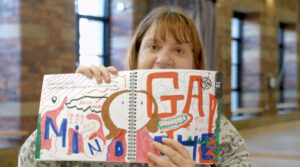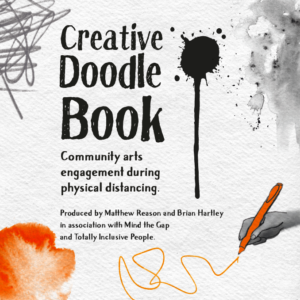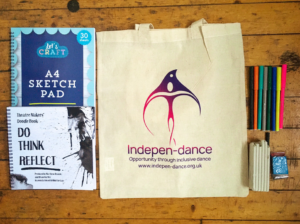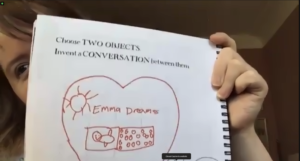Community Arts During Covid-19
The disruptions and requirement for physical distancing caused by Covid-19 throughout 2020 has forced the majority of community groups to drastically adapt, or even halt, their activities. The Creative Doodle Book is a UKRI AHRC Covid-19 funded project conducted by York St John University in collaboration with Mind the Gap Theatre Company. The focus of our project is modelling the delivery of inclusive creative practice, blending a well-designed physical resource with well-delivered online content. A particular emphasis of our project is working with people with learning disabilities, who as individuals claiming disability benefits and relying on complex, local support networks, have been especially vulnerable to the disruptions caused by the pandemic. Through this work we demonstrate, or re-affirm, what we already know: which is that doing something together – even while apart – is vital to our sense of self, our ability to feel in control of our lives, and our wellbeing.

What is the Creative Doodle Book?
During ‘normal’ times, the arts have a vital role in supporting resilience through providing opportunities for creative expression. The sense of ‘togetherness’ provided by such activities is also an underlying principle of community arts practice, which values being with other people as we make theatre, music and art together. Typically, this togetherness has been physical, involve the careful facilitation of arts practice with people doing the same activities in the same space. The Creative Doodle Book seeks to provide community groups and their facilitators with additional resources, support and skills to deliver engaging and inclusive arts practice while physically apart.
Over the course of the project we will use the Creative Doodle Book as a tangible and engaging physical resource, alongside carefully facilitated online workshops. Where appropriate these will be complimented by video, in-person, phone and postal support, particularly when working with individuals who have difficulty getting online. Each of the 20 community groups we work with will work with us over a four-week period, following a ‘train-the-facilitator’ approach through which we hope to invest and develop the skills, confidence and resources of practitioners to work in new and innovative ways.
You can watch our video introducing the Creative Doodle Book here.

The Creative Doodle Book in Practice
Our project begun working with community groups in November 2020, delivering a cycle of Creative Doodle Book workshops with inclusive arts companies Confi-dance (Canterbury), Indepen-dance (Glasgow) and The Lawnmowers (Newcastle) and Theatre Royal Wakefield’s training programme for young people In on the Act (Wakefield).
 Some of the initial responses to the project describe the way the Doodle Book and accompany workshops invites a particular kind of engagement, one which is light, playful, freeing. Confi-dance director Jo Frater observed that ‘It’s brought a really nice lightness to our slightly heavy turn of events over the last couple of months. And we’ve just enjoyed it. It’s always been something we’ve looked forward to doing and everyone feels great at the end of the week.’ While for Joshua Green, lead facilitator with The Lawnmowers, states that the workshops were ‘very light and playful and energetic and inclusive. It was fun and gentle, which was really, really needed. It came at a good time for us.’
Some of the initial responses to the project describe the way the Doodle Book and accompany workshops invites a particular kind of engagement, one which is light, playful, freeing. Confi-dance director Jo Frater observed that ‘It’s brought a really nice lightness to our slightly heavy turn of events over the last couple of months. And we’ve just enjoyed it. It’s always been something we’ve looked forward to doing and everyone feels great at the end of the week.’ While for Joshua Green, lead facilitator with The Lawnmowers, states that the workshops were ‘very light and playful and energetic and inclusive. It was fun and gentle, which was really, really needed. It came at a good time for us.’
One of the interesting initial reflections from the research has been on the unanticipated benefits from working at a social distance and online. These has included the discovery that the digital space produces new kinds of interrelationships that can have significant benefits. Jo Frater, for example, describes how working via Zoom produces a new kind of equity between participants and facilitators and Joshua Greene that it prompts greater autonomy and enhances techniques of turn taking. The Creative Doodle Book naturally works with these elements, providing each participant with their own ‘private space’ within which they can be creative while at the same time working alongside (virtually speaking) other people engaged in the same process. As Frater puts it: ‘they’re able to have their art time and creativity in a really private way and then they get to share it in this really nice, communal way. And it really fits with the technological advancement of zoom.’
Another insight has been how the Creative Doodle Book provides what facilitators have described as a valuable ‘reflective space’. Claire Reda, for example, discussed how some of the people Indepen-dance worked with struggled to support their own wellbeing, with the Creative Doodle Book providing a way of processes thoughts about friends, family, community and identity in a way that was ‘not shying away from those things, but not making it a negative.’

One of our hopes with the Creative Doodle Book project has been to provide community groups and facilitators with new ways of working, new skills and new resources with which to face the challenges of the ongoing pandemic. Several of the groups reported exhaustion at the ongoing circumstances, and how the process provided a new stimulus for positive working. For Indepen-dance, in the new year they plan to continue using the Doodle Book with more groups across their membership, including exploring how it might be used entirely offline or with participants as they begin to return to spaces in smaller numbers. As Claire Reda notes:
We have always had wellbeing at the front of the organisation but we can see the organisation changing and forming and adapting. And wellbeing is the key thing because we know we are not going to have 25 of our members, with their staff, in a studio for a long time. We need to build their confidence back up. We need to build their self-esteem, we need to build their sense of purpose. We need to build them being around people again. All of that is going to take time. And if we have a tool that can support that then we’re onto a winner.
Other groups similarly have plans to continue using the Creative Doodle Book process, with Tina Shuker the lead facilitator of In on the Act commenting:
I certainly, from my point of view, will be taking stuff forward into the studio when we return to in-person work, as an alternative to the ways that we have been working in the past. So for a practitioner that’s been doing it for 25 years, it certainly invigorated me, which I just wasn’t expecting from an online project.
Over the next 6 month we will work with another 16 community groups from around the country and also support the groups we have already worked with to continue and expand their use of the Creative Doodle Book. As the project continues we’ll develop further insights into the role of creativity to wellbeing and personal agency and support the vital work of community arts organisations during these difficult times.
For more information visit our webpages.


